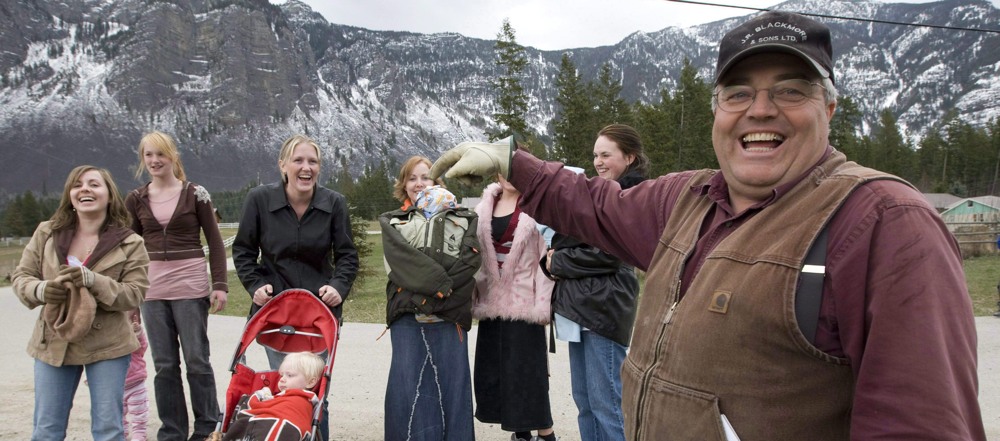Feminists call for decriminalization of polygamy
Prosecutors in British Columbia are taking another go at prosecuting Bountiful leaders for polygamy.
Winston Blackmore the religious leader of the polygamous community of Bountiful, B.C. shares a laugh with six of his daughters and some of his grandchildren, in this April 21, 2008 photo. A British Columbia court will start examining Monday whether Canada’s polygamy laws are constitutional. THE CANADIAN PRESS/Jonathan Hayward
Share
While B.C. prosecutors take another run at polygamy charges against two leaders of fundamentalist Mormon sects in Bountiful, feminist scholars will use renewed interest in the issue to take on the law.
Earlier this week, Winston Blackmore was accused of having 24 wives; James Oler, four. It’s the second time the men have faced polygamy charges, more than 20 years after allegations emerged of sexual abuse, child trafficking and plural marriage in the group of almost 1,000. A 2009 attempt was thrown out over disputes over how the province chose its special prosecutor.
In 2011, B.C. Supreme Court Chief Justice Bauman upheld the criminal law prohibiting polygamy. In a 335-page decision, he wrote that criminalizing polygamy violates freedom of religion, but is justified because polygamy is inherently harmful “to women, to children, to society.”
Many religious, women and children’s rights groups applauded the decision. However, some feminist scholars and civil libertarians strongly disagreed. They hope the latest headlines will renew the fight against polygamy laws.
Polygamy laws criminalize relationships between consenting adults, which is not in itself criminal, says Micheal Vonn, policy director at the British Columbia Civil Liberties Association (BCCLA), which intervened in the reference case. She says decisions about marriage should not fall within the realm of criminal law.
It’s especially important not to conflate polygamy with criminal behaviour, such as child abuse and sexual assault, she says. The fact that Oler, along with two other group members, also faces charges for unlawfully removing a child from Canada for sexual purposes is an entirely different discussion.
“We very vigorously suggested that the Crown go after any evidence of exploitation of children, in regards to Bountiful, writ large. We’ve asked for investigation of their education system, all credible allegations of regulatory or criminal misconduct.” But polygamy should not be used as proxy for going after criminal behaviour, Vonn says.
Beverley Baines is a professor at Queen’s University’s faculty of law who specializes in gender equality law. She says she’s glad to hear about the new polygamy charges, but not because she wants them to succeed. “I disagree strongly with Judge Bauman’s decision,” she says. “I thought the reference should have been appealed.”
Baines predicts Blackmore and Oler will bring another constitutional challenge citing religious freedom. She argues that as the case moves higher up court hierarchy, it will be difficult to argue for the criminalization of polygamy.
Baines says the evidence used in the decision didn’t use strong data that heard from women currently living in polygamous marriages. Angela Campbell, a law professor at McGill University, interviewed numerous women in Bountiful in 2008 and 2009. They told her polygamy was not harmful and that they were content. The final decision disregarded most of her testimony. One of Blackmore’s current wives, Marsha Chatwin, told the Canadian Press on Thursday the laws violate her religious freedom. “It seems ridiculous that they would say you can have relationships with people, but if it’s in the name of religion, then you can’t,” she said.
Baines would like to hear more from women currently in polygamous relationships. “As a feminist, I want to decriminalize polygamy so that more research can take place to find out if polygamy, as opposed to the effects of hiding off in secret enclaves, is harmful,” Baines says. The same is true for women living in polygamous relationships in other parts of Canada.
In 2008, the Toronto Star reported on Muslim polygamous marriages in the Greater Toronto Area, with one imam saying he has officiated more than 30 such unions. Baines hopes that if the prohibition of polygamy is considered by the Supreme Court of Canada, judges will recognize the “more serious multicultural implications.”
“My main concern is to allow the women who live in polygamous relationships to speak out, without fear of prosecution,” says Baines. “I think it’s terrible that people who choose this lifestyle and, in particular, the women, have to hide it and have to be stigmatized.”
While neither Vonn nor Baines necessarily endorses polygamy or calls for its legalization, they say it’s important to consider the roots of its criminalization. “All of our criminal code provisions were designed in a world that was primarily monogamous,” Baines says. She points out that we already know criminal behaviour occurs in monogamous relationships, and there’s “no reason to single out polygamy” on that basis. Vonn compares the law’s aversion to polygamy with relationships that were also deemed unacceptable in the past. “We have seen many, many kinds of relationship statuses criminalized in the past that we now view with abhorrence, from interracial to same-sex relationships,” says Vonn.
“If you believe the state has no right to criminalize your family choices, then you have to ask yourself on what grounds you think they can criminalize someone else’s.”
